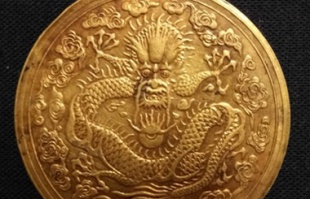Exhibition details the depiction of dragon

 |
| At the ongoing exhibition, Traveling Around the World: Chinese Dragons on Banknotes and Coins, currency exhibits are on display, showing the dragon grow to become ancient China's imperial symbol. [Photo provided to China Daily] |
In ancient China, a type of coin called yashengqian (money to suppress vicious spirits), was also used to convey good wishes in rituals rather than being used as a form of currency-and dragon images are found on these in abundance.
"Compared with the rigid format used in currency, we can see a much greater variety of dragon patterns and designs on these coins," Li explains. "They added new colors to Chinese numismatic culture and grew from depictions seen only in royal livery to later become a symbol for the country as a whole."
Consequently, the use of dragons has continued to be a common theme in currency long after the fall of the Chinese monarchy, and some of the exhibits are commemorative coins from contemporary times.
At the same time, the depiction of dragon has not just been limited to Chinese currency or the courtyards of the Forbidden City. Images of dragons also appeared frequently on foreign currency throughout ancient times, especially in neighboring countries influenced by Chinese culture like Vietnam and on the Korean Peninsula.



































